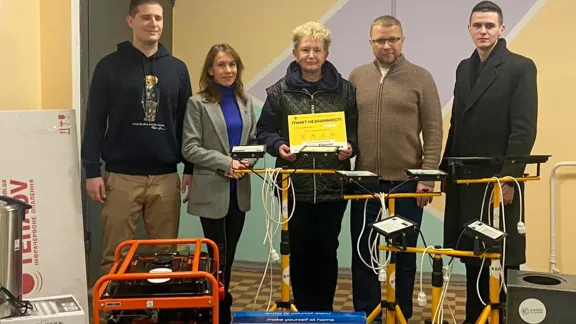LWF is working together with its member church in Ukraine and the local Youth Council to equip heating points in Kharkiv. As the city is still suffering frequent attacks on its infrastructure, these places allow people to warm up, eat and charge devices.

Youth Council and GELCU members before setting up a heating point in a school in Kharkiv. Photo: Kharkiv Youth Council
GELCU and LWF establish heating points
(LWI) - Heating points for the people of Kharkiv. The German Evangelical Lutheran Church of Ukraine (GELCU) and the Youth Council of Kharkiv are working together to equip heating points in the city. The Lutheran World Federation (LWF) supports this initiative through its office in Kyiv. These places serve as emergency shelters for people whose homes have been attacked or destroyed.
"Every activity freezes"
"In recent months, the Russian Federation has repeatedly attacked the city's critical infrastructure with massive missile strikes. As a result, many people are without electricity and water for several days," says Kavita Shukla, LWF Team Leader in Ukraine.
While the city's electricians usually reestablish water and power after a while, people and businesses in Kharkiv oblast had to adapt to frequent and long-lasting blackouts, explains Pavlo Shvarts, Bishop of GELCU, the local LWF member church.
"Thanks to the sacrificial work of the communal maintenance services, the city functions quite well in wartime, but the situation in the wider Kharkiv region (oblast) is worse. Usually, every activity freezes after the shelling of infrastructure. Heating points provide an opportunity to warm up for those who do not have heating or charge their phones if there is no electricity at home. It is also a place where they can have an Internet connection thanks to Starlink (a satellite internet constellation, providing Internet access via satellite) and generators, because when the light goes out, so does the mobile network."
Heating points provide an opportunity to warm up for those who do not have heating or charge their phones if there is no electricity at home.
– Bishop Pavlo SHVARTS, GELCU
Cooperation with Kharkiv Youth Council
The heating points are being set up together with the Kharkiv Youth Council, which has delivered humanitarian aid to Kharkiv residents since the beginning of the war and already runs several heating points in schools. Each of those places can accommodate up to 100 people.
People receive hot food and can access running water, electricity, toilets, medicine, and personal hygiene products – things that have become rare in Kharkiv in the past months. In addition, a Swiss company, Solexis, has offered in-kind donations of solar panels to complement equipment in these places to provide lighting and an energy source for cooking or charging phones and computers. The needs are significant, says Arsenii Suhachov from the Kharkiv Youth Council.
"Since the war has been going on for almost ten months, there is an unemployment crisis in the city, in simple words - a humanitarian catastrophe," says Arsenii. "You can't imagine how many people are now living below the poverty line in the city. Many have lost their homes. When we launched our hot food distribution points two weeks ago, 13,000 Kharkiv residents showed up on the first day, and this although we did not advertise these points in the media."
Staying connected
LWF also supports Lutheran congregations in Kharkiv and the Odesa region with communications equipment. Kharkiv, Novohradkivka and Petrodolyna are located in areas affected by regular blackouts and occasional shelling of critical infrastructure. At the same time, these congregations actively support the neighborhood. GELCU, therefore will receive three sets of Starlink equipment and a six-month subscription. "Two of these will go to our village congregations (Novohradkivka and Petrodolynske) in the Odesa region, where the situation with mobile connection and the Internet is quite bad, especially after missile attacks on the infrastructure of the region," Bishop Shvarts explains.
The third set is meant for the congregation in Kharkiv. "Of course, in times of crisis, we would like to support our neighbors with stable Internet access and become a hub where they can get help. In addition, in each of these congregations, we have been teaching computer literacy classes for children and adults for more than three months thanks to the help of the Gustav Adolf Foundation in purchasing computers and software." A stable Internet connection is vital for that.
The LWF response in Ukraine is supported by LWF member churches, related agencies, and other partner organizations.


